BEYOND THE HEADLINES

What's Next for Syria?
October 11, 2018 | New York, NY
Anne Barnard, The New York Times
Moderator: Maureen White, Johns Hopkins SAIS, WFPG Board of Directors
New York, NY—On October 11, 2018, the WFPG hosted a Beyond the Headlines discussion on What’s Next for Syria? with veteran New York Times foreign correspondent and Council on Foreign Relations 2018-19 Edward R. Murrow Press Fellow Anne Barnard. The conversation focused on the situation in Syria and the resilience of the Syrian people, the international community’s failure to address human rights abuses in Syria, as well as the challenges facing journalists covering Syria and other ongoing conflicts. The discussion was moderated by WFPG Board Member Maureen White, who is also a senior fellow in the Foreign Policy Institute at Johns Hopkins SAIS, and co-sponsored by the Institute for International Education.
Barnard, who has led The New York Times’ coverage of the devastating war in Syria for the last six years, opened the conversation with a candid analysis of the situation in Syria, as well as the potential ramifications of the conflict. She suggested that the nature of the war meant that everyone involved, regardless of faction or affiliation, found themselves “exhausted, wondering about the country’s future.” The generational consequences of over 100,000 disappeared Syrians are significant, and Barnard emphasized that the disappearances have an extremely chilling effect on peaceful protestors and Syrian idealists seeking to bring about a new system of political pluralism from the ground.
In addressing the international community’s response to the Syrian conflict, Barnard offered a pointed rebuke of the inaction of global institutions. She theorized that the lack of a robust response to the crisis in Syria has highlighted the problems in the international humanitarian system, and precipitated the view within Syria that the world was willing to stand by and watch as the government decimated its own people. This approach, according to Barnard’s sources in Syrian, has caused the international community, and particularly the United States, to be viewed with a great deal of skepticism throughout Syria. She characterized the American policy approach to Syria as “walk softly, and carry a small stick”, noting that while American policymakers are more than willing to discuss the issues faced by Syria at length, they are considerably less willing to transform talk into action.
When asked about the most challenging aspect of her work, Barnard referred to the ongoing nature of the conflict, citing a lack of a “light at the end of the tunnel” which has caused a great deal of stress and fatigue. As a journalist, she wants to believe that she can illuminate the reality of situations and encourage global change, but the lack of response to Syria’s crisis has challenged that belief. Barnard discussed the unique situational trauma of engaging with conflict from afar through social media and online platforms; rather than sharing the danger on the ground with her sources. Additionally, Barnard cited the nonstop inflow of traumatic stories and images to her personal phone that remote contact necessitates, pointing out that these images share space with pictures of her children and her day-to-day life, making it extremely difficult to draw boundaries and separate oneself from the realities of conflict.
In discussion with audience members, Barnard was asked whether she believed there could be any functional process of reconciliation for Syria, or whether the country’s social fabric was simply beyond repair. Barnard pointed out that war crimes investigators are very confident that, at some point in the future, there will be some form of accountability for the human rights abuses perpetrated by the Syrian government, even if it’s impossible to predict what form that will take. There are unprecedented efforts to document these abuses through evidence and testimony, and Barnard emphasized that regardless of how accountability occurs, it is vital for “history, epistemology, critical thought, and the very basis of liberal society” to have these facts recorded.
Despite the frustration expressed by Barnard and stakeholders at the lack of action by the international community, Barnard emphasized that vital work is being done both in Syria and abroad to document human rights abuses, address the needs of millions of refugees, and amplify the voices of those who continue to struggle for a better Syria.
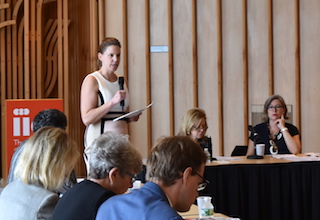 |
 |
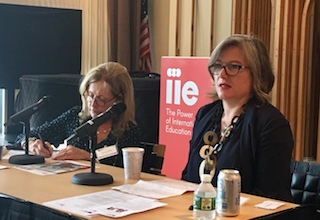 |
|
Sarah Kherief discusses IIE's Platform for Education in Emergencies Response (PEER) Program
|
|
Anne Barnard discusses the situation in Syria
|
|
|
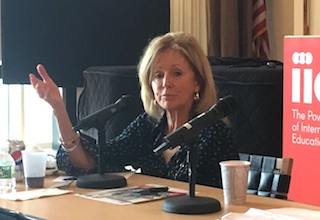 |
 |
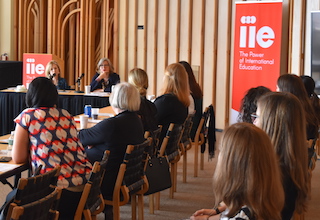 |
|
Maureen White moderates the discussion
|
|
Audience members during the discussion
|
|
|
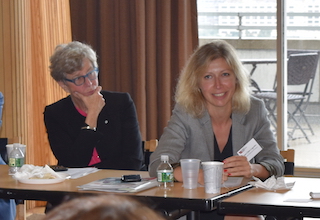 |
 |
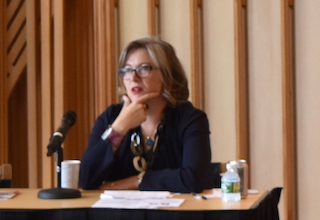 |
|
Consul General of Canada Phyllis Yaffe and
Consul General of France Anne-Claire Legendre
|
|
Anne Barnard during the Q&A
|
|
|
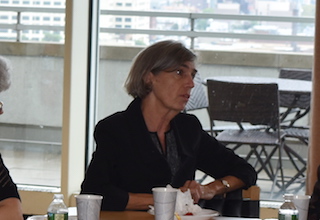 |
 |
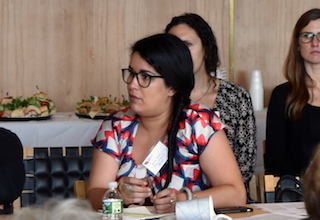 |
|
Maureen Quinn asks a question
|
|
Karine Hacen, Permanent Mission of France to the UN
|
|
|
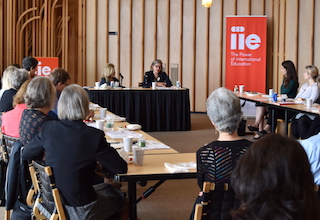 |
 |
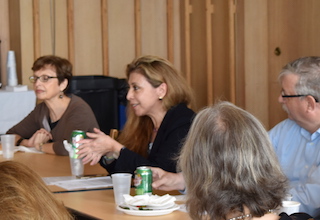 |
|
Anne Barnard addresses WFPG and IIE
|
|
Ambassador Helena Yánez-Loza, Deputy Permanent Representative of Ecuador to the United Nations
|
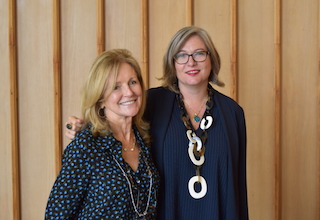 |
 |
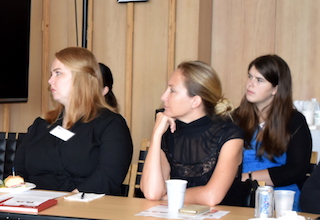 |
|
Maureen White and Anne Barnard
|
|
Audience members during the discussion
|
|
|
| |
 |
|